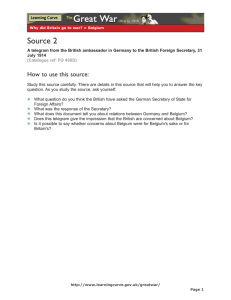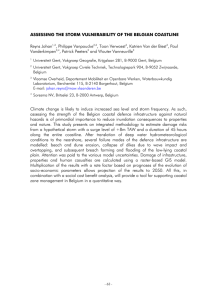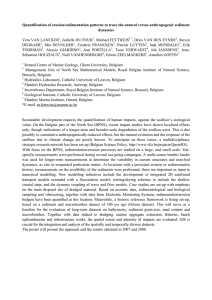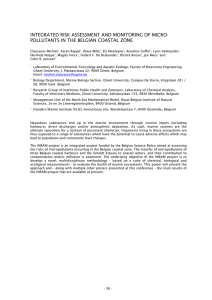www.XtremePapers.com
advertisement
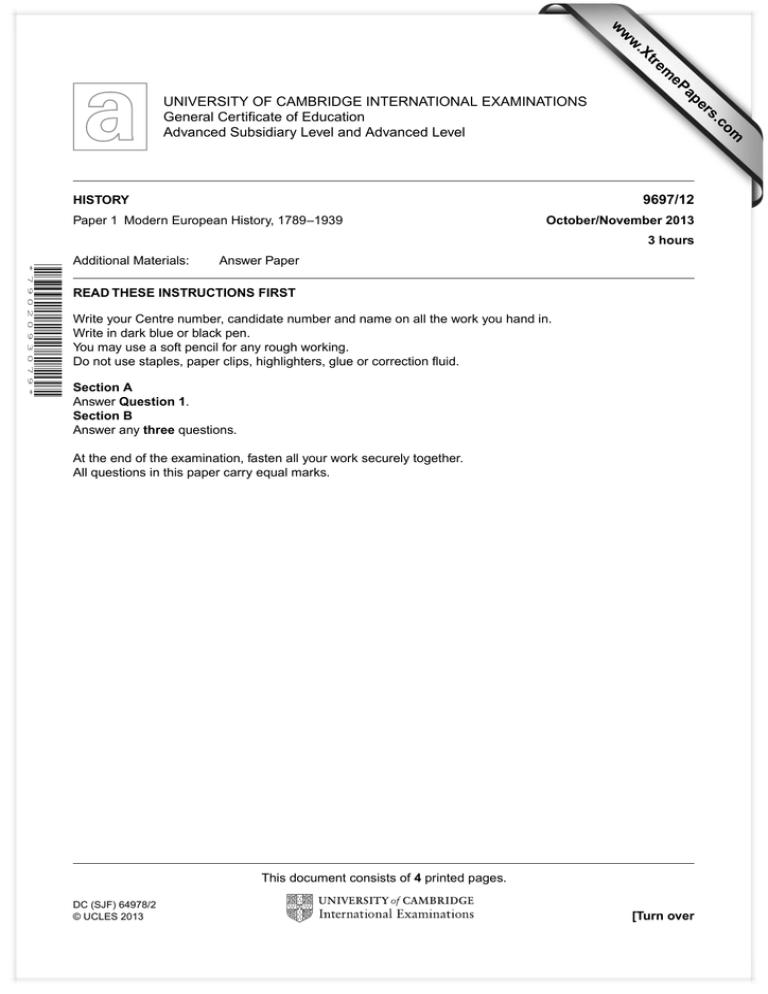
w w ap eP m e tr .X w om .c s er UNIVERSITY OF CAMBRIDGE INTERNATIONAL EXAMINATIONS General Certificate of Education Advanced Subsidiary Level and Advanced Level 9697/12 HISTORY Paper 1 Modern European History, 1789–1939 October/November 2013 3 hours * 7 9 0 2 0 9 3 0 7 9 * Additional Materials: Answer Paper READ THESE INSTRUCTIONS FIRST Write your Centre number, candidate number and name on all the work you hand in. Write in dark blue or black pen. You may use a soft pencil for any rough working. Do not use staples, paper clips, highlighters, glue or correction fluid. Section A Answer Question 1. Section B Answer any three questions. At the end of the examination, fasten all your work securely together. All questions in this paper carry equal marks. This document consists of 4 printed pages. DC (SJF) 64978/2 © UCLES 2013 [Turn over 2 Section A: The Origins of World War I, 1870–1914 You must answer Question 1. BELGIUM 1 Read the Sources, and then answer the question. When answering Question 1, candidates are advised to pay particular attention to the interpretation and evaluation of the Sources both individually and as a group. Source A The international situation is serious, and the possibility of a war naturally preoccupies the Belgian Government. Belgium has most scrupulously observed the duties of a neutral State according to the treaty of 1839. The friendly feelings of other countries towards her have been so often confirmed that Belgium confidently expects that her territory will remain free from any attack, if hostilities should break out upon her frontiers. All necessary steps to ensure respect of Belgian neutrality have nevertheless been taken by the Government. The Belgian army has been mobilised and is taking up such strategic positions as have been chosen to secure the defence of the country and its neutrality. These measures are intended solely to enable Belgium to fulfil her international obligations. It is obvious that they neither have been, nor can have been, undertaken with any intention of taking part in an armed struggle between the major Powers, or from any feeling of distrust of any of those Powers. Davignon, Belgian Minister for Foreign Affairs, in a message to the Belgian ambassadors in other European countries, 24 July 1914. Source B The Belgian fortress of Liège has been captured after a brave defence. Germany most deeply regrets that war should have resulted from the attitude of Belgium towards Germany. Germany is not coming as an enemy into Belgium. It is only owing to the military measures of France that Germany had to take the grave decision of entering Belgium. Now that the Belgian army has upheld the honour of its arms by its heroic resistance to a very superior force, Germany begs the King of the Belgians and the Belgian Government to spare Belgium the further horrors of war. Germany is ready for any fair agreement with Belgium. Germany once more gives her solemn assurance that it is not her intention to keep Belgian territory for herself and that such an intention is far from her thoughts. Germany is still ready to evacuate Belgium as soon as the state of war will allow her to do so. A message from the Dutch Ministry of Foreign Affairs (on behalf of the German government) to the Belgian Ministry of Foreign Affairs, 9 August 1914. © UCLES 2013 9697/12/O/N/13 3 Source C According to all its patriotic press, Britain has entered into this war solely because of her zeal for the neutrality of Belgium. Only because of the danger to Belgian neutrality was the mighty heart of Britain moved to action and she reluctantly went to war against Germany. But all that we see tends to make us suspect that Britain has simply made an excuse of Belgium. She deliberately tempted Belgium from her neutrality, and having committed that brave little kingdom to the fight has coldbloodedly left her towns, cities and territories to be defended by her own unaided efforts. Whilst howling long and loudly against the violation of the neutrality of Belgium, Britain did nothing to prevent it. For all those horrors Belgium has to thank her stupid governing class, and the cunning, heartless British diplomacy that sacrificed Belgium. ‘How Britain Sacrificed Belgium’, an article in an Irish nationalist and Marxist newspaper, October 1914. Source D I declared in the Reichstag that only extreme necessity and the struggle for existence compelled Germany to march through Belgium. Germany was ready to make compensation for the wrong committed. Britain drew the sword only because it believed its own interests demanded it. It would never have entered the war just for Belgian neutrality. Documents on the Anglo-Belgian military agreement which we have found show plainly enough how Britain regarded this neutrality. We found in the archives of the Belgian Foreign Office documents which showed that Britain in 1911 was determined to throw troops into Belgium without the agreement of the Belgian government if war had broken out then. In other words, it would do exactly the same thing for which, with all the appearance of virtuous indignation, it now criticizes Germany. Bethmann Hollweg, German Chancellor, speaking in 1914. Source E We are not fighting a war of aggression against the German people. Their leaders have persuaded them that they are fighting a war of self-defence against a league of rival nations determined to destroy Germany. That is not so. Most reluctantly and unprepared, we were forced to join in this war in self-defence. Germany’s invasion of Belgium ruthlessly trampled on the most solemn treaty obligation on which the peace of Europe rested. We had to join in the struggle or stand aside and see Europe go under. Brute force would have triumphed over public right and international justice. It was only that dreadful alternative that forced Britain into the war. The first requirement always put forward by Britain and its allies, has been the complete restoration of the independence of Belgium, and then suitable reparation as can be made for the devastation of its towns and provinces. This is not a demand for a war indemnity, such as that imposed on France by Germany in 1871. Lloyd George, Britain’s Prime Minister, explains Britain’s war aims, January 1918. Now answer the following question. ‘Germany was the guilty party in the Belgian crisis in 1914.’ Use Sources A–E to show how far the evidence confirms this statement. © UCLES 2013 9697/12/O/N/13 [Turn over 4 Section B You must answer three questions from this section. 2 Assess the aims of the French revolutionaries in 1789. 3 ‘The Industrial Revolution benefited the working classes in the nineteenth century.’ How far do you agree with this claim? (You should refer to at least two of Britain, France and Germany in your answer.) 4 Evaluate Mazzini’s contribution to the unification of Italy. 5 How similar were the problems that faced European imperialists in Africa and Asia in the late nineteenth century? (You should refer to at least two of Britain, France and Germany in your answer.) 6 Why was the February Revolution in 1917 a more serious danger to Nicholas II than the 1905 Revolution? 7 Assess the claim that Mussolini’s only consistent aim as ruler of Italy up to 1939 was the preservation of his personal power. 8 Why did the peasantry remain a significant problem for Tsarist and Communist rulers of Russia up to 1939? Permission to reproduce items where third-party owned material protected by copyright is included has been sought and cleared where possible. Every reasonable effort has been made by the publisher (UCLES) to trace copyright holders, but if any items requiring clearance have unwittingly been included, the publisher will be pleased to make amends at the earliest possible opportunity. University of Cambridge International Examinations is part of the Cambridge Assessment Group. Cambridge Assessment is the brand name of University of Cambridge Local Examinations Syndicate (UCLES), which is itself a department of the University of Cambridge. © UCLES 2013 9697/12/O/N/13
